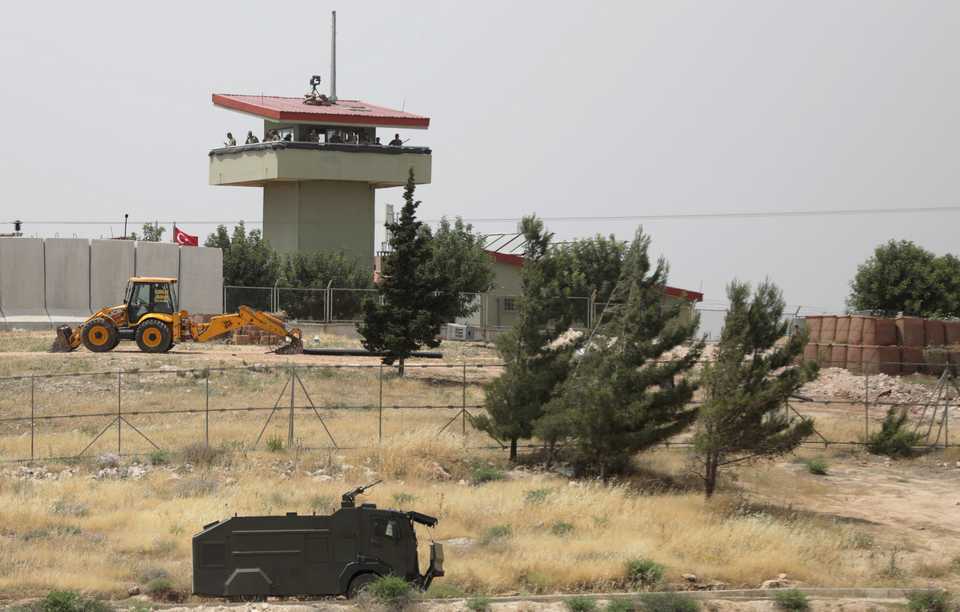The debate on what Turkey will do next is raging in Ankara as Bashar al Assad’s forces intensify their attacks in Idlib province, the last opposition bastion in Syria, attacking civilians and fighters alike to capture the crucial Aleppo-Damascus M5 highway.
Turkish Defence Minister Hulusi Akar has already signalled that Ankara will do what’s necessary to keep civilians safe and its interests intact in Idlib if Russia lets the Assad regime violate the Sochi and Astana agreements. The agreements led to the creation of de-escalation zones in the region.
“If the agreement kept being violated, we have Plan B and Plan C,” Akar said in an interview on Sunday, indicating that Turkey will not let the Assad regime claim Idlib.
“We, on every occasion, say ‘do not force us, otherwise our Plan B and Plan C are ready’,” Akar said. Without specifying what these plans are, he appeared to imply another possible military operation.
Turkey has established twelve observatory posts around Idlib province, according to a 2018 agreement between Moscow and Ankara, but the recent Assad offensive has put those in danger by placing Turkish soldiers in harm’s way.
Regime attacks have killed 13 Turkish soldiers in just one week, eliciting powerful Turkish retaliations against Damascus.
But even more could be on the way.
“Our observation posts there will remain in place within the agreement. Despite this, if there is an obstacle, we put it clearly that we will do what’s necessary,” Akar declared.

Turkish President Recep Tayyip Erdogan warned the Assad regime to roll-back his forces behind Turkish observatory posts before the end of February.
“If the regime does not pull back during this time, Turkey will have to do this job itself,” Erdogan said a meeting of his governing party MPs in Ankara.
Devlet Bahceli, the Nationalist Movement Party [MHP] leader, who is a crucial ally to Turkish President Recep Tayyip Erdogan and his government, came out with strong words against Assad on Tuesday, indicating that a red line has been crossed by the regime.
“As long as Assad is not dethroned, Turkey will not have peace. From now, we have to make plans to enter Damascus and obliterate tyrants there,” Bahceli said.
The MHP leader has been known for his tough stances, but his Syria reaction might also be indicative of what the state apparatus might think as a whole.
It’s not the first time Turkey and Syria are facing each other in a military fashion. In 1998, under intense PKK attacks, Turkey demanded Damascus to expel the terrorist group’s leader Abdullah Ocalan, who had been sheltered by former President Hafez Assad, Bashar Assad’s father, for two decades in Syria.
Otherwise, Turkey will enter Syria to do the job by itself, Ankara told Damascus at the time.
Eventually, Damascus backtracked and expelled Ocalan and the PKK leadership from Syria, deescalating tensions between the two countries.
A couple of days ago, Turkey was on the verge of another big operation after its forces were attacked by the Assad regime. But a Russian delegation visit to Ankara appeared to delay the operation because Turkey did not want to categorically burn its bridges with the Russians in Syria.
“Turkey will announce its steps against the Assad regime tomorrow,” Erdogan said on Tuesday as a US delegation is currently discussing the Idlib situation with Turkish officials.
Turkey has launched three complex operations against terrorists ranging from Daesh to the YPG/PKK in the last four years in northern Syria. Before all the operations, Turkey undertook tense negotiations with its Russian, American, European and Iranian counterparts.
Recent diplomatic traffic in Ankara might mean that the state will make its ultimate decision after negotiations with its US counterparts.
What can Turkey do?
One of the options could be joining other Turkey-controlled territories in northern Syria with Idlib if a potential operation claims the province in order to secure Turkish observatory posts there.

Turkey wants to create safe zones in northern Syria to relocate its nearly four million-strong refugee population in those areas. If the regime claims Idlib, which has been populated by at least three million people, another refugee crisis appears to be unavoidable as they are already hitting the roads towards the Turkish border.
Turkey does not want to be hit with another flow of refugees. With a possible Idlib operation, Ankara could have joint control over a swath of territories across its border, addressing both its border security issues and refugee problem.
But an operation might also put the Turkish army in direct confrontation with regime forces, a scenario Ankara wants to avoid. As a result, Turkey, which expressly respects the territorial integrity of Syria, aims to exhaust all diplomatic means before a military confrontation with Damascus.
In the case of a Syrian breakup, it’s not clear how Turkey would react in terms of its controlled territories in northern Syria, which covers some parts of the ‘Aleppo Vilayet’ from the Ottoman period.
During the Turkish Independence War following World War I, the nationalist forces led by Mustafa Kemal Ataturk declared a National Pact (Misak-i Milli), which covered current Turkish territories, the Ottoman Aleppo Vilayet and Ottoman Mosul Vilayet, which corresponds to present-day northern Iraq.

According to the pact, Turkey claimed sovereignty over those territories in northern Syria and Iraq.
But in 1921, at the request of the French government, Turkey signed the Ankara Treaty, ceding some parts of the Aleppo Vilayet to Paris, which had a mandate over Syria following WWI.
However, Ankara was able to recover the Iskenderun Sancak, the port district of the Aleppo Vilayet, through intense negotiations with France and other European powers in 1939, just before World War II, making it a part of Turkey and turning the Sancak into its Hatay Vilayet, which borders Syria’s Idlib Province.










Discussion about this post